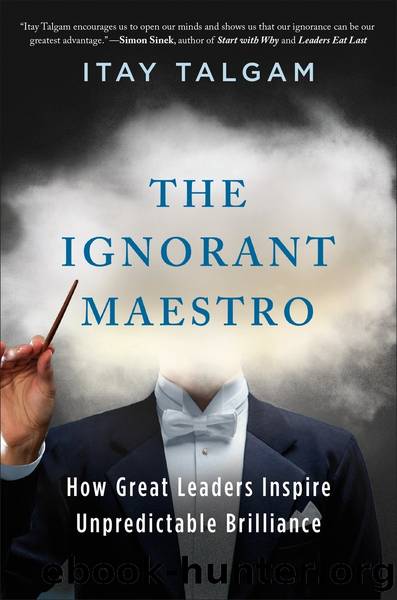The Ignorant Maestro by Itay Talgam

Author:Itay Talgam
Language: eng
Format: epub
Publisher: Penguin Publishing Group
Published: 2015-04-20T16:00:00+00:00
CHAPTER SIX
Play by the Book: Richard Strauss
In an age when politicians rise and fall based on their TV appearances, visual impression seems to be crucial. When I show Strauss conducting to my seminar audiences, they come to instant and almost unanimous conclusions about his leadership style. It makes them laugh. Very few would want him as a colleague, and the few who would take him as their boss can think of only one reason: He is so ineffective, they say, that they would be able to do whatever they wanted without him interfering in any way. So what do our eyes miss here? After all, Straussâs contemporaries famously claimed that he was a wonderful conductor, but there is no visual evidence to that whatsoever.
Richard Strauss (1864â1949) was certainly one of the towering figures of twentieth-century music, first and foremost as a composer, having created works that are still an essential part of the repertory of any respectable opera house. Works such as Elektra and Salome pushed the boundaries of the art form with new orchestral sound and other bold and unfamiliar aspects.
The composer/conductorâs life, especially his later life, would make for a great opera itself, especially around his complicated relations with the Third Reich.
But if his life and his music were full of drama, his conducting wasnât. The film fragments we haveâand weâre lucky to have them, as they were recorded in early 1940, when the world was on fireâshow him nearing his eighties. As the orchestra plays one of Straussâs own compositions, the conductorâs low eyelids suggest a state of detachment, as if half asleep, only occasionally opening for a short, highly focused look in the direction of one of the sections of the orchestra.
The few gestures that stick out of the continual series of very small and almost monotonous hand movements are all of a reactive nature: Strauss is seemingly startled by a loud, booming timpani, and raises his left hand as if hushing another section of the orchestra. Nothing in his conducting is proactive, anticipating action. He is only holding the orchestra back: âItâs too much alreadyâ his gestures seem to say. âGet back inside the box!â Is Straussâs old age at the time of filming the reason for that complete lack of engagement and enthusiasm? Is it burnout or a leadership style?
The young Strauss himself gave us the answer to this question, writing what he called âThe Ten Golden Rules for the Album of a Young Conductor.â The list is written in his half-humorous style, and as is quite often the case with Strauss, one cannot be sure whether he is being serious or sarcasticâI suspect both at once. The list includes the simple rule: âDo not sweat!â as well as the somewhat perplexing instruction never to look at the trombones (and other brass), as âit only encourages them!â
Both rules taken together give us an interesting insight into his attitude both toward himself and toward his musicians. It is not about me, says Strauss: I am
Download
This site does not store any files on its server. We only index and link to content provided by other sites. Please contact the content providers to delete copyright contents if any and email us, we'll remove relevant links or contents immediately.
The Goal (Off-Campus #4) by Elle Kennedy(12423)
Kathy Andrews Collection by Kathy Andrews(10506)
Diary of a Player by Brad Paisley(6863)
What Does This Button Do? by Bruce Dickinson(5519)
Assassin’s Fate by Robin Hobb(5228)
Big Little Lies by Liane Moriarty(4876)
Pale Blue Dot by Carl Sagan(3995)
Sticky Fingers by Joe Hagan(3449)
The Heroin Diaries by Nikki Sixx(2928)
The Death of the Heart by Elizabeth Bowen(2895)
Beneath These Shadows by Meghan March(2711)
The Help by Kathryn Stockett(2700)
Confessions of a Video Vixen by Karrine Steffans(2668)
How Music Works by David Byrne(2519)
Jam by Jam (epub)(2480)
Harry Potter 4 - Harry Potter and The Goblet of Fire by J.K.Rowling(2413)
Strange Fascination: David Bowie: The Definitive Story by David Buckley(2364)
Petty: The Biography by Warren Zanes(2234)
Darker Than the Deepest Sea by Trevor Dann(2205)
